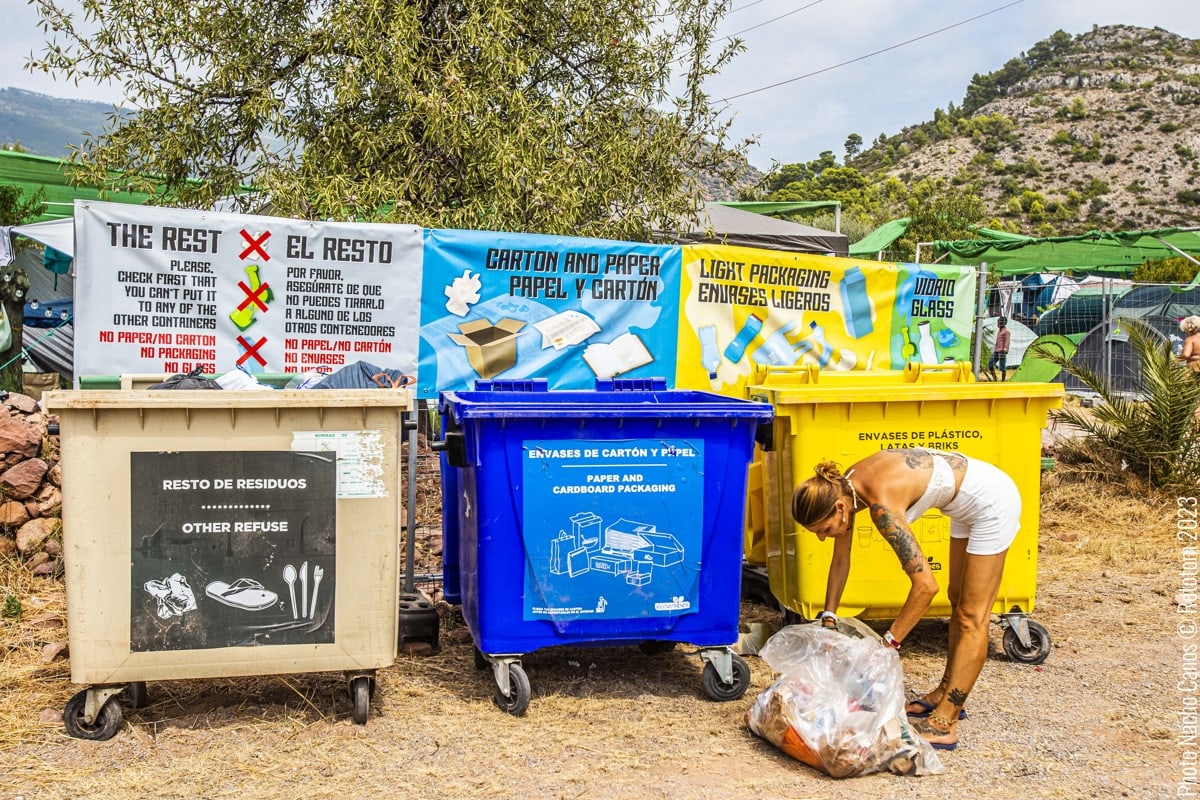Self-management of waste for recycling and new photovoltaic LED lighting that minimises copper consumption and emissions complete the sustainable philosophy of the cultural event.
Being circular implies giving value to the products and materials used to carry out a given activity, and ensuring that all the resources implemented are used efficiently and serve their purpose for as long as possible over time, in order to minimise waste generation and the environmental impact.
The international reggae festival Rototom Sunsplash, which takes place in Benicàssim (Castelló), from 16 to 21 August, takes up again in its 29th edition this path of circularity applied since its origins. Once again this summer, the Three R’s -reduce, reuse and recycle- roar mightily in this global gathering built around Jamaican music, which has already activated its countdown. The formula is simple, but firm: the aim is to reduce the generation of waste as much as possible and to give a second life to the element whose generation could not be prevented.
These are the keys to being a “circular” festival in harmony with the environment:
100% reusable cups with zero waste
One of the festival’s commitments to a circular economy is embodied in the system of reusable cups that prevails at Rototom Sunsplash, which not only avoids the consumption of plastic (consolidating the festival’s ‘plastic free’ seal) but also reduces the consumption of this material to produce new cups year after year.
“We can say that our cups are 100% reusable, and with zero waste. We don’t make disposable collections for each edition. Every year we make the effort to wash and sanitise the cups in order to reuse them with full guarantees the following year”, explains Fiachra Mc Donagh, the person responsible for the festival’s sustainability and solidarity initiatives.
This year the public will be able to return their cup at the bars in the venue, with the subsequent refund of the purchase price.
Going local to reduce emissions
“After 15 years in Benicàssim, we can say that we are a local festival,” says Mc Donagh. Most of the team that makes Rototom Sunsplash possible resides in the province and the organisation relies on local suppliers and resources at local, provincial and regional level, from logistics to catering, to make each edition go ahead.
Last year, as for the site and campsite build, on a total surface area of 300,000 square metres, 200 companies took part, 70% of them local and provincial. 100% of the plumbing and transport services were from Castelló; as for electricity, 65% of the firms came from Benicàssim and 35% from Valencia; 60% of the sound was managed by people from the province – and the rest came from Valencia and Barcelona; while for the work at heights, professionals from Benicàssim and the capital of the Túria were used.
A similar pattern year after year for the build that includes other sustainable elements: the handcrafted scenography created by a specialised team are reused and put to good use, without undermining safety or creativity, and which every summer fill the site with replicas of the iconic lion and the omnipresent green, yellow and red.

Self-management of recycling and new photovoltaic lighting
Once again this summer, Rototom Sunsplash takes on the challenge of recycling and responsibly managing its own waste. This year it will do so under a new self-management system.
Furthermore, the efficiency and sustainability of the lighting system has been reinforced, with the installation of new photovoltaic LED street lights on the site (10 units, to illuminate accesses and emergency exits) and in the campsite (another 10 for the common areas).
Thanks to them, the festival will eliminate the consumption of up to 2 kilometres of copper cable in the venue; and 500 metres of cabling in the case of the campsite, as well as achieving a reduction in consumption of 4,000 watts in each of the spaces, with the consequent drop in emissions.
Support for social projects in the region
Along with environmental actions, every year Rototom Sunsplash organises initiatives to support the social projects of entities linked to the territory. This year the proceeds will help finance the purchase of two adapted vans for the users of AFA Castelló and Cocemfe Castelló. It will also serve to support the actions of L’Aurora Grup de Suport, specifically the project to implement a humanitarian civil rescue fleet in Sicily like the one that already operates on the coast of Castelló; and will contribute to the programme ANAR Telephone/Chat ANAR to help children and adolescents at risk in the Valencian Community, of the ANAR Foundation.
How does it work? In the 2024 edition, the beneficiaries of the free admission tickets to the festival (children under 13 years old, people over 65 years old and people with an accredited disability over 65%) will be invited to donate the symbolic 10 euros to one of the four entities mentioned above in order to collect their ticket.
In addition, the live artworks that will participate the Social Art Gallery, the festival’s open-air museum, will be on sale with the aim of supporting more social projects.
